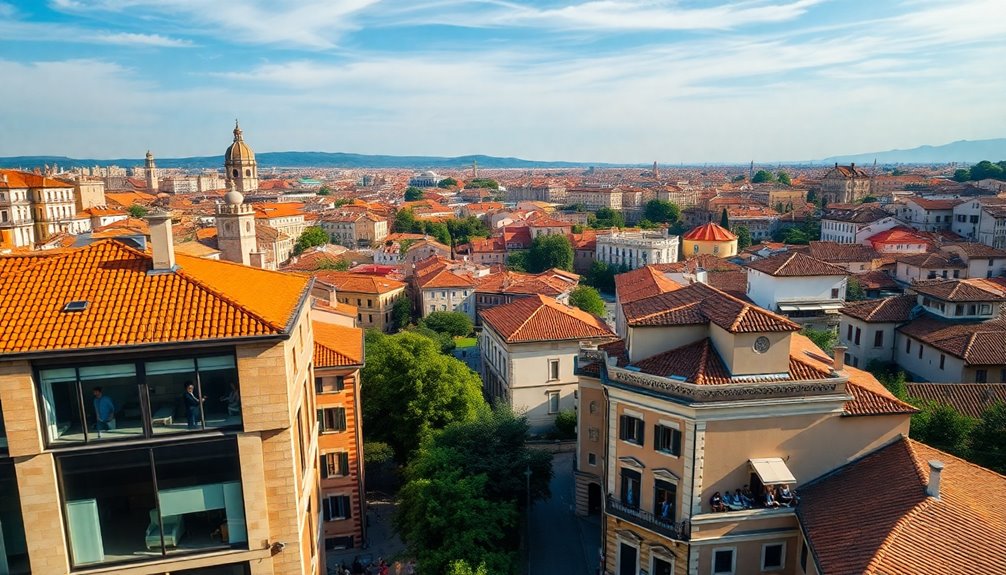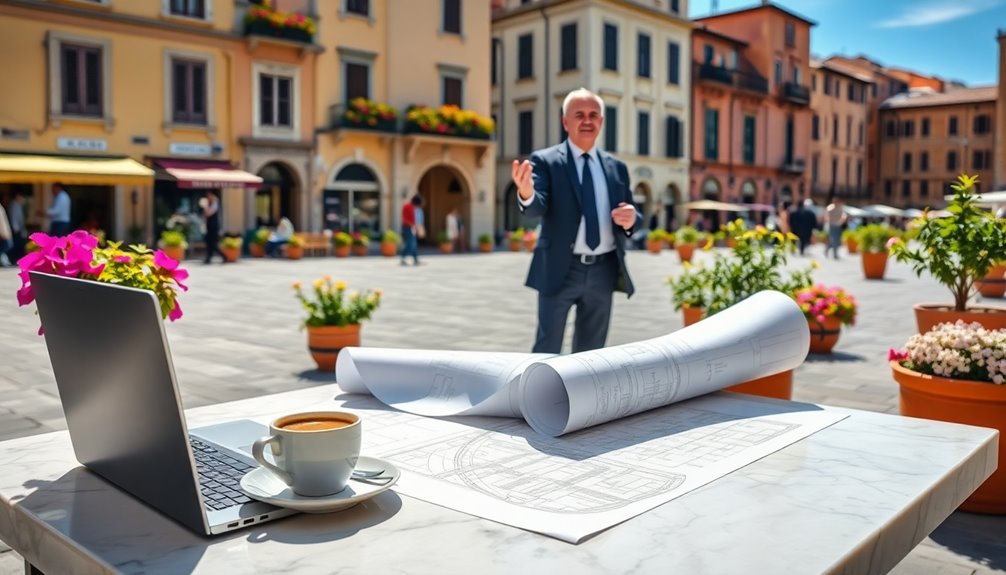Hiring an architect in Italy usually costs between 10% and 15% of your total construction budget. However, prices can vary based on the complexity of your project and where you're located. For example, working in major cities tends to be pricier due to higher living costs. If your project is intricate or involves unique features, expect the fees to rise. Keep in mind that there are also additional costs like permits and VAT, which can affect your budget. Want to discover more about managing these expenses effectively? There's plenty of valuable information ahead!
Key Takeaways
- Architect fees in Italy typically range from 10% to 15% of the total construction costs, depending on project complexity.
- For clearly defined projects, lump sum fees provide certainty with total costs known upfront.
- Refurbishment costs vary significantly; Venice can reach €1,400 per square metre, while southern regions average around €1,300.
- Additional costs, including building permit fees and VAT, should be factored into the overall budget.
- Payment options for architect services include fixed fees, hourly rates, or percentage-based fees, with adjustments possible for scope changes.
Fee Structures Overview

When you're considering hiring an architect in Italy, it's important to understand the various fee structures available.
You can choose from percentage-based fees, which typically range from 10% to 15% of the construction cost, providing flexibility if project scopes change.
Lump sum fees offer certainty, as they cover clearly defined projects and allow you to know the total cost upfront.
For less defined projects, hourly rates might be appropriate, charging you based on the time spent. Understanding the average construction cost in Italy, which is about €2,500 EUR per square metre, can help you estimate the architect's fee based on your project's size.
Keep in mind that additional costs like travel, printing, and VAT can apply, influencing the overall budget.
Understanding these structures will help you make informed decisions tailored to your project's needs.
Geographic Pricing Variations

Understanding the various fee structures is just the beginning; geographic pricing variations play a significant role in the cost of hiring an architect in Italy.
In major cities, like Venice, you'll find fees soaring due to high living costs and competition, with refurbishment costs hitting 1,400 euros per square metre. Conversely, rural areas offer lower costs, but your choice of architects might be limited. Notably, average refurbishment costs in southern regions like Bari are approximately 1,300 euros per square metre.
Central Italy typically charges about 400 euros more per square metre than southern regions like Bari. High-demand locations, such as historical centres, often require specialized services and incur additional fees due to stricter regulations.
Local economic factors, like the cost of living and skilled professional availability, also influence your overall expenses.
Impact of Project Complexity

As projects grow in complexity, the costs associated with hiring an architect in Italy can considerably increase.
For residential projects, fees typically range from 10% to 15% of construction costs, but more intricate designs can push you toward the higher end. New builds often come with lower fees, while remodels may demand more detailed oversight, driving costs up.
You might also encounter hourly or fixed fees, especially for specific services like planning permission drawings. The more unique features or custom elements in your project, the more you'll pay. Percentage of construction cost is a traditional method for billing, which can provide a clearer understanding of costs for both parties.
If revisions or unexpected changes arise, be prepared for additional costs as the architect's involvement increases. Ultimately, the project's size and complexity directly influence your architect's fees.
Additional Costs and Taxes

Hiring an architect in Italy involves more than just their professional fees; you should also factor in various additional costs and taxes that can greatly impact your budget.
For instance, building permit application fees can range from €1,250 to €3,000 for a 100 square meter property.
You'll also need to take into account urbanisation and construction charges, which could cost between €250 and €750 per 10 square meters.
Additionally, VAT at 22% applies to most services, with reduced rates for specific construction work. It's important to note that VAT regulations stipulate that VAT is due where the building is located, which can affect your overall costs.
If you're purchasing land, the registration tax is 9% of the land's value, or VAT at 22% if buying from a company.
Understanding these costs is essential to avoid surprises down the line.
Payment and Budget Management

When budgeting for architectural services in Italy, it's crucial to account for the architect's fees as they can considerably impact your overall project costs. Typically, these fees range from 10% to 15% of your construction costs, depending on the project's complexity.
You can choose between fixed fees, hourly rates, or percentages of the total budget. If your project scope changes, be prepared for potential adjustments in fees. Additionally, many professionals accept major international credit cards, which can offer flexibility in payment methods.
For payments, bank transfers are common, and using services like Wise can lower international fees. Opening a local bank account can also streamline transactions.
Confirm invoices are itemized, detailing services rendered, and consider partial payments at various project phases to manage cash flow effectively.
Frequently Asked Questions
How Do I Choose the Right Architect for My Project?
Choosing the right architect for your project involves several key steps.
First, assess their experience with similar projects and evaluate their professional background.
Check their local knowledge and project management skills.
Review their design approach to guarantee it aligns with your vision.
Don't forget to request references and a portfolio.
Finally, clarify their fee structure and verify open communication throughout the process to keep everything on track.
Are There Standard Contracts for Architect Services in Italy?
When you're looking for standard contracts for architect services in Italy, it's important to know that there aren't specific Italian forms.
However, you can adapt international contracts, like FIDIC, to fit local laws.
Make sure your contract clearly outlines roles, services, and compliance with building regulations.
Including payment methods and schedules is vital, too.
This way, you'll create a solid foundation for your project while adhering to local practices and legal requirements.
What Should I Expect During the Initial Consultation?
During the initial consultation, you'll discuss your needs and project brief with the architect.
They'll present outline proposals and initial concepts based on your aspirations, budget, and timeline.
Expect them to conduct feasibility studies and provide technical consultation on planning values.
You'll receive various services like sketches and floor plans to guarantee your project's viability.
This meeting lays the foundation for a successful collaboration, so be prepared to share your vision and goals.
Can Architects Assist With Obtaining Planning Permissions?
Yes, architects can definitely assist you with obtaining planning permissions.
They'll help you navigate the complex application process by preparing and submitting necessary documents like blueprints and technical reports.
They'll guarantee compliance with local zoning laws and regulations, communicate with city planning officers, and even negotiate with public offices if needed.
With their expertise, you can feel confident that your project meets all legal requirements and is on the right track.
How Do Architect Fees Compare to Other Construction Costs?
When you look at architect fees compared to other construction costs, you'll typically find them ranging from 10% to 15% of your total project expenses.
While construction costs can average around €2,500 per square meter, architect fees add a significant layer to your budget.
Conclusion
In Italy, hiring an architect can vary widely based on fees, location, and project complexity. By understanding the different fee structures and potential additional costs, you can better manage your budget. Remember to factor in local pricing variations and any taxes that may apply. Overall, being informed helps you make the best decision for your project and guarantees a smooth collaboration with your architect. Don't hesitate to ask questions and clarify costs upfront!










